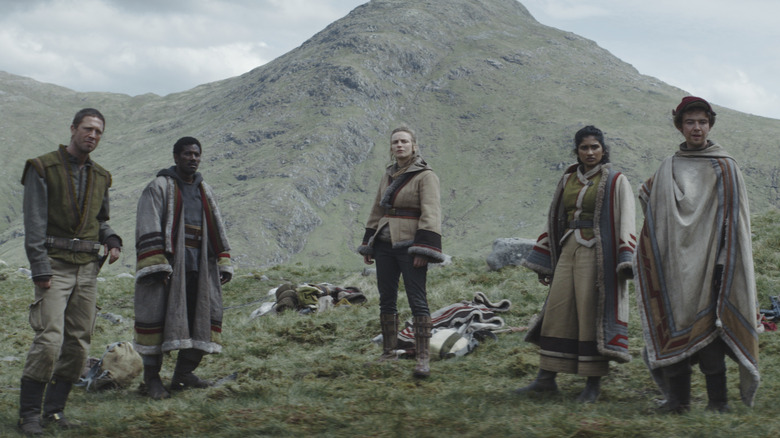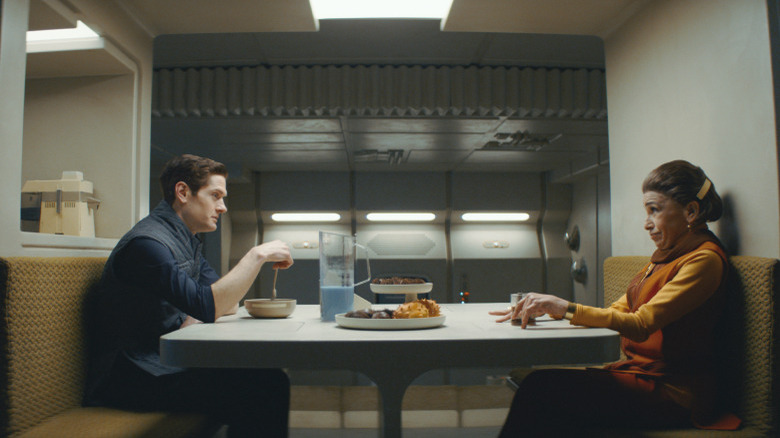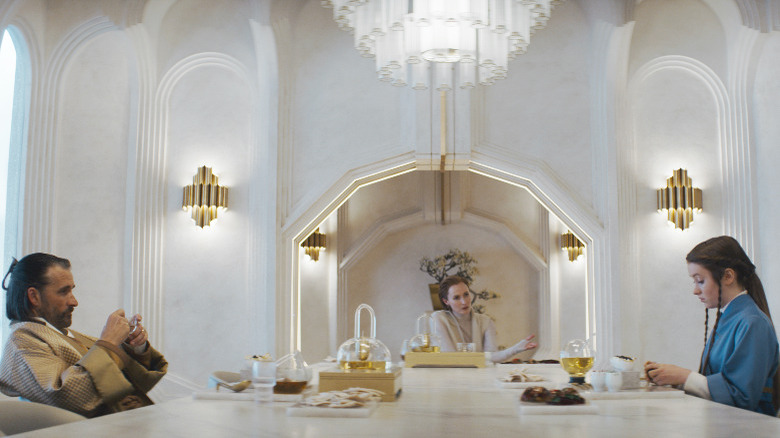Andor Thrives At Showing Us What The Star Wars Movies Never Could
This post contains spoilers for "Andor" episode five.
Be they overwhelming, underwhelming, or just whelming ("Solo," anyone?), the "Star Wars" movies are always a ride. That they hit the ground running and rarely let up, so far as their pacing goes, has allowed the films to retain their broad appeal, even as they've begun to dig deeper and deeper into the minutiae of life in a galaxy far, far away. This also presents a dilemma for a live-action "Star Wars" series: How do you adapt the movies' approach to storytelling, which is all about forward momentum, for a longform narrative medium without making the whole thing feel like an over-long film?
Of the first three live-action "Star Wars" TV shows prior to "Andor" ("The Mandalorian," "The Book of Boba Fett," and "Obi-Wan Kenobi"), it's "The Mandalorian" that's had the most success in this regard. More than the other series, the saga of Din Djarin and his little green son has really embraced the idea of being a serial adventure, with episodes that feel like proper episodes and not chunks of a movie. This has also allowed the show to pull back the curtain on the mundanities of life in the "Star Wars" galaxy in a way the films simply don't have time to do.
"Andor," to its benefit, has only doubled down on this tactic, giving us an episode like "The Axe Forgets" where, as its detractors will no doubt argue, "nothing happens." But by showing us the "nothing" that transpires between intricate heists and deadly shoot-outs, the series is doing something meaningful that the "Star Wars" movies never could.
Star Wars people — they're just like us!
Consider what actually transpires in "The Axe Forgets." There are not one but two whole scenes of Syril (Kyler Soller) idly toying with his cereal and sulking like an overgrown kid at breakfast while his mother Eedy (Kathryn Hunter) prattles on about his career prospects and contacting his uncle for help. We also learn about Karis' (Alex Lawther) manifesto in-between the glimpses of Cassian (Diego Luna) and the other Aldhani Rebels preparing for their mission. Elsewhere, Lt. Gorn (Sule Rimi) does the rounds inspecting the Imperial base on Aldhani and making sure everyone's pulling their weight. And don't forget the growing friction between Mon Mothma (Genevieve O'Reilly) and the rest of her family!
Considering how much people didn't care for the Galactic Senate scenes in "The Phantom Menace" when it first came out, one can only imagine how they might've once reacted to an entire episode of TV devoted to the domestic aspects of life in the "Star Wars" galaxy. Do we really need to know about Karis' ideals or Arvel's (Ebon Moss-Bachrach) tattoos? Or to see how Gorn subtly ensures his troops' defenses will be down when the Rebels attack? Were "Andor" a film, much of this material would most likely wind up on the cutting room floor (in the event it was written at all) in order to devote more runtime to the actual upcoming heist, and for valid reason.
As it were, "Andor" the show makes a strong case that depicting the humanity of all its characters is not just what the live-action "Star Wars" TV series should focus on more going forward, it's just as compelling as their giant space battles and extravagant set pieces.
Ordinary life is pretty complex stuff
It feels like the biggest shared movie and TV universes are slowly cottoning onto the fact that when people say, "I would watch an hour of [X] and [Y] eating lunch," they mean it. "She-Hulk," for example, has found its groove by devoting episodes to superheroes and villains doing things as ordinary as going on dates or attending therapy. Likewise, "House of the Dragon" only just aired one of its finest hours to date, and much of it consisted of in-laws who can barely stand each other being forced to make casual chit-chat at a funeral.
"The Axe Forgets" presents "Andor" at its strongest for the same reason. It treats the everyday drama between a parent and their child — not just Syril and Eedy but also Mon Mothma and her daughter Leida (Bronte Carmichael) — with the same gravity as Mon Mothma and her husband Perrin Fertha's (Alastair Mackenzie) marital discontent, or Cassian learning to work with others and let his defenses down enough to get Arvel to open up to him about his own tragic past, if not starting to trust him. Even the glimpse we get of an Imperial officer on Ferrix eager to claim his office space (like the dorky fascist he is) helps to make the show's characters feel real in a way other "Star Wars" live-action series haven't always managed to do.
Again, most of this would be fairly deemed unnecessary in a "Star Wars" film since you just don't have the freedom to dwell on the complexities of ordinary life. By zeroing in on this, "Andor" goes even further than "The Mandalorian" in demonstrating just how much "Star Wars" stands to benefit creatively from its recent move to the small screen.
New episodes of "Andor" premiere Wednesdays on Disney+.


